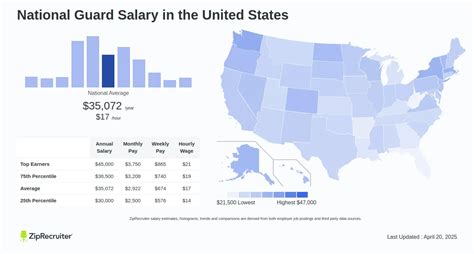Serving in the National Guard offers a unique opportunity to build a rewarding career, serve your community and country, and earn a respectable income—all while maintaining a civilian life. But how does compensation work for this unique part-time military role? While pay can vary significantly based on your specific duties, a member on active duty can earn an annual salary ranging from approximately $35,000 for junior enlisted personnel to over $180,000 for senior officers.
This guide breaks down the complexities of National Guard pay, exploring the key factors that determine your earnings and the outstanding benefits that come with service.
What Does a National Guard Member Do?

The National Guard is a unique branch of the U.S. Armed Forces with a dual mission. Members are "citizen-soldiers" or "citizen-airmen," meaning they train part-time to be ready for deployment by both their state governor and the President of the United States.
Responsibilities typically include:
- Part-time Training: The most common commitment is "one weekend a month, two weeks a year." This involves attending drills (Inactive Duty Training) and a two-week Annual Training period to maintain mission readiness.
- State Emergencies: Responding to domestic crises such as floods, hurricanes, wildfires, and civil unrest as directed by the state governor.
- Federal Missions: When called upon by the federal government, National Guard units deploy alongside active-duty forces for missions around the world.
This dual structure means a Guard member's salary is not a fixed annual figure but is instead based on the type and duration of their service.
Average National Guard Salary

Unlike a traditional civilian job, there is no single "average salary" for a National Guard member, as most serve part-time. Instead, compensation is calculated based on rank, time in service, and duty status.
The most common form of payment is Drill Pay. A standard drill weekend consists of four four-hour drill periods. For each period, a member earns 1/30th of their monthly active-duty base pay. Therefore, a typical drill weekend earns a member four days' worth of active-duty pay.
Let's look at some concrete examples based on the 2024 U.S. Military Pay Charts provided by the Defense Finance and Accounting Service (DFAS):
- Entry-Level Enlisted (E-3, Private First Class with under 2 years of service):
- Monthly Active-Duty Pay: $2,546.70
- Typical Weekend Drill Pay: ($2,546.70 / 30) * 4 = $339.56
- Annual Drill Pay (12 weekends): Approximately $4,074.72
- Mid-Career NCO (E-6, Staff Sergeant with over 8 years of service):
- Monthly Active-Duty Pay: $4,098.30
- Typical Weekend Drill Pay: ($4,098.30 / 30) * 4 = $546.44
- Annual Drill Pay (12 weekends): Approximately $6,557.28
- Junior Officer (O-2, First Lieutenant with 2 years of service):
- Monthly Active-Duty Pay: $5,102.10
- Typical Weekend Drill Pay: ($5,102.10 / 30) * 4 = $680.28
- Annual Drill Pay (12 weekends): Approximately $8,163.36
When activated for full-time duty (for training, state emergencies, or federal deployment), members receive their full monthly active-duty pay plus tax-free allowances for housing and food. According to Salary.com, the average salary for an Army National Guard soldier in the U.S. is around $61,712, a figure that likely blends part-time drill pay with periods of full-time activation.
Key Factors That Influence Salary

Several key factors determine a Guard member's earnings. Understanding these elements is crucial to forecasting your potential income.
### Rank and Years of Experience
This is the most significant factor. Military pay is structured around two tiers: Enlisted personnel and Commissioned Officers. Within each tier, pay increases with rank (e.g., from Private to Sergeant) and with time in service (e.g., a Sergeant with 6 years of experience earns more than one with 2 years). Officers, who are typically college graduates, have a significantly higher pay scale than enlisted members.
### Duty Status
Your "duty status" dictates how you are paid:
- Inactive Duty Training (IDT): This is the standard "one weekend a month" drill. Pay is calculated as detailed above.
- Annual Training (AT): This two-week period is considered active duty. You receive 15 days of your full base pay plus allowances.
- Active Duty (Title 32 or Title 10): When activated for state or federal missions, you transition to full-time status. You earn your full monthly base pay and are also eligible for significant tax-free allowances, including:
- Basic Allowance for Housing (BAH): A monthly stipend to cover housing costs, which varies by location and rank.
- Basic Allowance for Subsistence (BAS): A monthly stipend for food.
### Geographic Location
While base pay is standardized across the country, geographic location dramatically impacts your take-home pay when on active duty for over 30 days. The Basic Allowance for Housing (BAH) is calculated based on the cost of living in your specific zip code. For example, according to the Department of Defense's BAH Calculator, an E-5 with dependents in San Diego, CA, receives a much higher housing allowance than an E-5 in rural Kansas, reflecting the difference in housing costs.
### Area of Specialization
Your specific job, known as a Military Occupational Specialty (MOS) in the Army or an Air Force Specialty Code (AFSC) in the Air Force, can influence your earnings through bonuses and special pays. While base pay is the same for every E-4, an E-4 in a high-demand field like cyber security, intelligence, or special forces may be eligible for:
- Enlistment Bonuses: Lump-sum payments for committing to a critical-need job.
- Incentive Pays: Extra monthly pay for hazardous duty (like flight pay or jump pay) or for holding special qualifications.
### Level of Education
Education directly impacts your entry point and long-term earning potential.
- High School Diploma: Allows you to enlist at ranks E-1 to E-3.
- Bachelor's Degree: Typically allows you to enlist at a higher rank (E-4) or to join as a Commissioned Officer (O-1), starting on a much higher pay scale.
- Advanced Degrees: Can be a prerequisite for specialized officer roles (e.g., doctors, lawyers) which come with their own advanced pay grades and incentives.
Furthermore, the National Guard offers significant education benefits, such as Tuition Assistance and the GI Bill, which can help you advance your civilian education and, in turn, your military career.
Job Outlook

The U.S. Bureau of Labor Statistics (BLS) groups all military branches, including the National Guard, under Military Careers. The outlook for these roles is not based on economic growth but on the congressionally mandated size of the armed forces, which is determined by national security needs and global events.
The BLS notes that opportunities should remain stable, with thousands of positions becoming available each year as service members complete their commitments or retire. The National Guard provides exceptional job security, benefits, and training that are highly valuable in the civilian sector, making it a stable and strategic career move.
Conclusion

A career in the National Guard is more than just a job; it's a commitment to service that offers a unique blend of civilian life and military purpose. While the salary structure is complex, it is transparent and rewards advancement in rank, skill, and experience.
Key takeaways for prospective members are:
- Pay is supplemental: For most, Guard pay is a second income stream earned through part-time work.
- Full-time potential exists: Activations for training, emergencies, or deployments provide full-time pay and benefits comparable to or exceeding many civilian roles.
- Benefits are a major component: The salary is only part of the equation. Low-cost health insurance (TRICARE Reserve Select), retirement pensions, education benefits, and home loan guarantees provide immense financial value.
- You control your advancement: By gaining experience, pursuing education, and taking on leadership roles, you can directly increase your earning potential throughout your career.
For those looking to serve their country, learn valuable skills, and secure a strong financial future, the National Guard offers a pathway filled with opportunity and purpose.
